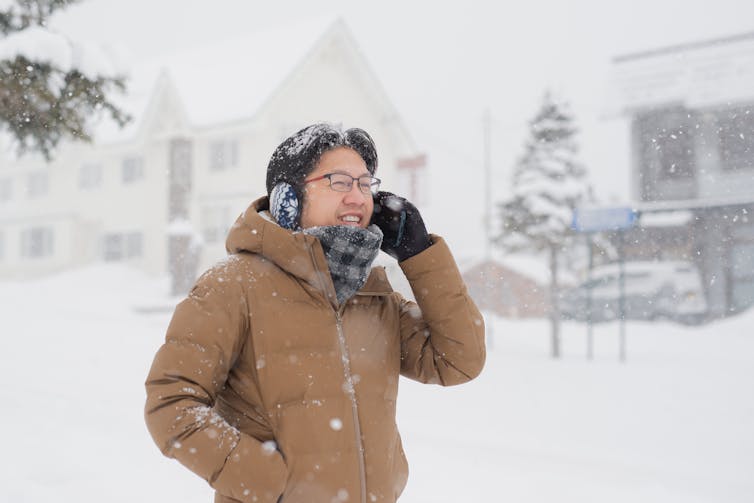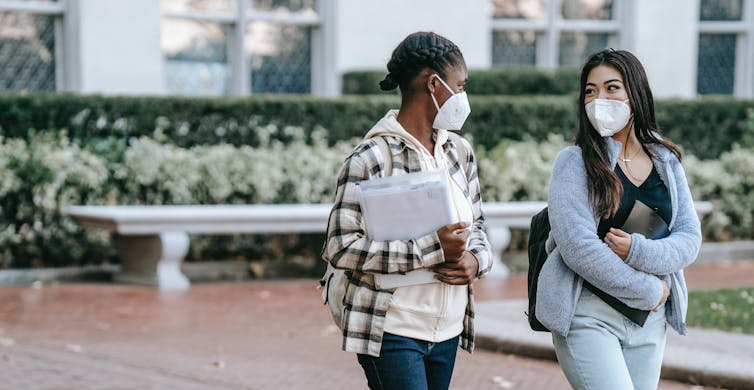
After experiencing weeks or months of excitement building up before you left your home for the thrill of a North American education, you might now be feeling the need to cope with stress, especially with news of .
You may feel lonely and wondering what to do during this holiday as your friends are spending time with their families, a luxury you may not have due to . In addition, as some campus and university services have been restricted due to COVID-19 and many will be on holiday hours, you may face isolation which can evoke emotional memories and hardships.
So, here we , two international students. Our research expertise is respectively in critical analyses of international education, and student well-being and school-based mental health intervention. We study at Concordia ����vlog���� in Montreal (Ezgi) and at Johns Hopkins ����vlog���� in Baltimore (Qiyang). We offer suggestions to you — and your communities — on how to better support your mental health and wellness.

To cope with stress, it’s crucial to take steps to stay connected and find support when facing obstacles. Source: Shutterstock
Managing elevated pandemic stressors
On top of the obstacles you have probably faced, such as , the pandemic has , and .
Additionally, if you are an Asian international student, you have likely been coping with . Research in the US shows this discrimination in the pandemic has included hate crimes and vicarious discrimination (seeing or hearing about hate crimes and discrimination and worrying about them), and that these experiences are associated with poorer self-reported mental and physical health. In Canada, researchers similarly documented a ; hate crimes descent people rose by 301 per cent in 2020.
Studying under these circumstances is challenging. Therefore, we consider your psychological, social, and emotional well-being as we write this holiday letter to you.
Mental health stigma
We care about you, not only because of the obstacles you face, but also because of the lack of help-seeking behaviours among international students. of the international students in the US and Canada come from India and China. Researchers with the China-India Mental Health Alliance have found in these countries. can burden you heavily, especially when we consider that your host institutions may be unaware of these cultural barriers.
Therefore, mental health may not be a topic you have previously been encouraged to reflect on. Maybe you’ve been told to keep your head down and just get good grades. Or perhaps you think that it is only you who is struggling, and everyone else has it together.
Peer-support groups to cope with stress
Have you previously tried peer support groups? These groups provide and expand your network. While socialising with your peers, you can .
For example, including the Canadian Asian society, that help students with . There are also trained in active listening and providing peer support. Search for your institution’s social support opportunities to get involved and benefit.

Peer wellness ambassadors can be one source of support to cope with stress. Source: Charlotte May/Pexels
Combatting systemic racism and cultural biases
Experiencing discrimination could . You are likely frustrated by injustices and would like to take action against racism. It is necessary to combat anti-Asian racism and other .
Princeton ����vlog���� . We advise you to keep your eyes open for similar workshops.
Participating in unconscious bias . The most effective training does more than help students become aware of their own biases in a new environment, but also to build stronger networks with other students concerned with bias, discrimination or systemic racism .
Although we encourage you to find these workshops, your institutions may not offer or tailor them to your needs. We suggest seeking ways to have your own racial justice task force and build bridges with fellow students .
Raise your voice and share This engagement is essential.
Culturally responsive counselling services
It is OK not to be OK. ����vlog���� counselling services are available to help. Please do not worry about privacy issues, as all conversations will remain confidential. We encourage you to try at least one session, especially if you have doubts.
Having said this, we know that mental health and student support campus programs tailored to . Research proposes that one reason for . what culturally relevant services are available at your campus.
Some universities have counsellors and therapists who are proficient in foreign languages or have international backgrounds. For example, Tufts ����vlog����’s counselling and mental health team hires a culturally sensitive generalist clinician who is bilingual in English and Mandarin .
We worry about your well-being and encourage you to take steps to take care of yourselves. For students, this might mean stepping forward to ask for help or pinpoint what social supports, engagement and institutional supports you need, or sharing this article with your peers, communities and institutions so that they can become aware of your needs and support you better.
For people in university communities, it might mean making an extra effort to reach out to international students on or off-campus they know over the holidays. In the longer term, what’s critical is prioritising hiring counsellors of diverse backgrounds, providing more social chances for international students to bond and organising workshops to discuss international students’ needs and concerns.
By , PhD Candidate, Education, and , PhD Student, School of Education,
This article is republished from under a Creative Commons license. Read the .







